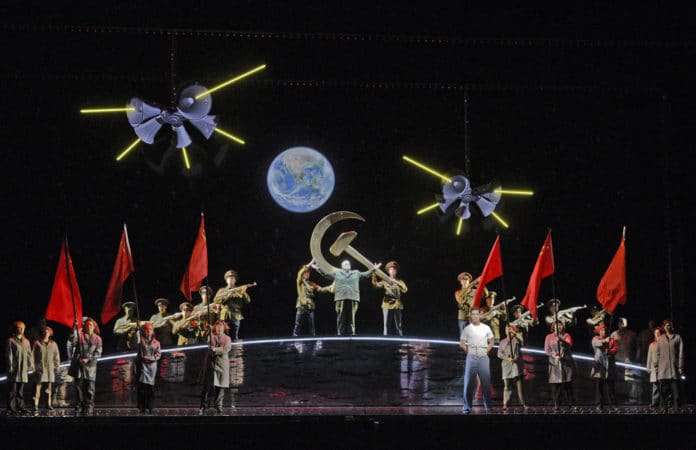LBJ was always larger than life. Now, he’s downright operatic.
Within the last six months, I’ve seen LBJ singing in the bathroom in two separate operas. Last November, he conducted his business in the Oval Office in “Appomattox” at the Washington National Opera. On Saturday, he serenaded John F. Kennedy in his bath in one of several dream sequences in “JFK” by David T. Little and Royce Vavrek, which had its much-anticipated premiere at the Fort Worth Opera Festival.
Little, 37, has become a hope for the future of opera since the success of his and Vavrek’s last opera, “Dog Days,” a chamber opera about a post-apocalyptic world. But success in a small-scale work doesn’t always translate to the stage of a mainstream opera house. The tremendous expectations for “JFK” drew critics and opera insiders from around the country to the premiere; and both creators seem to have taken a lot of those expectations upon themselves in their palpable efforts to make their opera Great with a capital G. It’s a credit to both their talents that they manage to pull off some measure of dramatic coherence in this ambitious, uneven, and sometimes appealing work.
Attempts at realism don’t always translate well to the opera stage; and Little and Vavrek haven’t even tried. While their opera faithfully follows the chronology of Kennedy’s last night, which he spent with Jackie in a Fort Worth hotel, it’s also deliberately over the top. It attempts at once to be portentous (two of the three Fates accompany Kennedy’s final hours); to depict the birth of an American mythology (with big surging melodious music that gives cinematic emphasis to key moments, as when Jackie puts on her pink pillbox hat); and to offer a meditation on mortality. (Near the beginning and end of the opera, the chorus gently invokes “fragile life,” in soft music like falling petals.)
And while the creators say it’s not a “political opera,” the fact that it doesn’t have a plot per se means that some of the characters in Thaddeus Strassberger’s bright, graphic production – Nikita Khrushchev (Casey Finnegan, sounding strained) on the moon surrounded by members of the Red Army in one dream sequence; LBJ (gleefully played by an exuberant Daniel Okulitch) in the bathroom with a backup posse of rhinestone cowboys in another – have the satiric punch of political cartoons.
Vavrek and Little have set themselves a daunting challenge in trying to create a dramatic work based largely on moments of narrative stasis (starting with Jackie Kennedy’s opening aria in a Fort Worth hotel room, “Midnight is the Loneliest Hour”). Their point is to slow the inexorable march of time toward the fate that awaits Kennedy in Dallas, something they achieve by expanding the operatic tradition of characters stepping out of the narrative and expounding on their inner thoughts, and by withholding bits of information – including the assassination, which is not directly depicted on stage. To their credit, “JFK” keeps a sense of dramatic movement despite containing so many pauses and flashbacks, unlike some other last-night-of-life operas (“Yardbird,” about Charlie Parker, comes to mind).
You could argue that any depiction of JFK is a priori political; and you could certainly call “political” Vavrek’s depiction of him as a callow young man weakened by pain and almost without a voice, buffeted by feverish dreams of his past and political present, and overshadowed by the far clearer delineation of Jackie’s character. The work’s ultimate act of withholding is its refusal to reveal much of Kennedy’s own inner voice (sung ably by the baritone Matthew Worth) until the very end of the opera, when an aria about how lucky he is is tinged with poignancy as he enumerates a roster of caveats.
It’s Jackie, though, who does most of the heavy lifting; and one of the opera’s deliberate go-for-broke moments is a trio for three women: Jackie, her future self Jackie O (sung with warm depth by Katharine Goeldner), and a maid named Clara who is also an incarnation of one of the Fates – Talise Trevigne, lovely but underutilized in a strange tripartite part. Trevigne and her fellow-Fate, the strong, slightly strident tenor Sean Panikkar, also appear as Clara Harris and Major Henry Rathbone, who was stabbed while trying to keep John Wilkes Booth from shooting Abraham Lincoln, and later went mad and killed Harris, his fiancé.
The whole Fate/historical figure conceit is an example of some of the unnecessary baggage the opera is carrying on its bid for greatness. Still, the musical and dramatic lines remain pretty clear. The composer, mercifully free of a need to prove his sophistication, has written a score that retains a cinematic clarity: here the effulgent romance of a love duet, here the ominous precursors of what is to come, obvious as “Carmen’s” Fate theme, all clearly spotlight by the Fort Worth Symphony Orchestra conducted by Steven Osgood.
Parts of this opera are frankly eye-rolling, trafficking in eager, honest clichés: Fates and “fragile lives” and all. Yet overall, the piece represents an honest attempt to make a work of art that can communicate with a broader audience without sacrificing its integrity, drawing on lots of elements of the operatic tradition without merely copycatting other works. (Yes, you can hum along. No, it does not sound like Puccini.) As an evening of theater, it has serious flaws, but its very openness, its outsized Texas scale, its accommodation to the gung-ho community that commissioned it, makes it worth a second look (which it will get at the Opéra de Montreal, a co-commissioner). Personally, I didn’t like it very much. But you might.
Information:
JFK, part of the Fort Worth Opera festival, will be performed again on May 1 and May 7.
www.fwopera.org/






